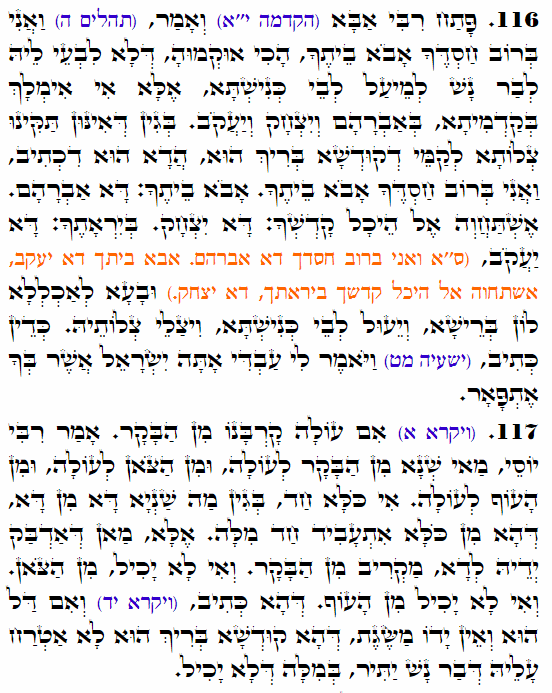Daily Zohar # 3599 – Vayikra – Can you afford your sins
Hebrew translation:
117. אִם עֹלָה קָרְבָּנוֹ מִן הַבָּקָר. אָמַר רַבִּי יוֹסֵי, מַה שּׁוֹנֶה מִן הַבָּקָר לְעוֹלָה וּמִן הַצֹּאן לְעוֹלָה וּמִן הָעוֹף לְעוֹלָה? אִם הַכֹּל אֶחָד, מִפְּנֵי מָה שׁוֹנִים זֶה מִזֶּה, שֶׁהֲרֵי מֵהַכֹּל נַעֲשֶׂה דָבָר אֶחָד? אֶלָּא מִי שֶׁהִשִּׂיגָה יָדוֹ אֶת זֶה – מַקְרִיב מִן הַבָּקָר, וְאִם לֹא יָכוֹל – אָז מִן הַצֹּאן, וְאִם לֹא יָכוֹל – אָז מִן הָעוֹף, שֶׁהֲרֵי כָּתוּב(ויקרא יד)וְאִם דַּל הוּא וְאֵין יָדוֹ מַשֶּׂגֶת, שֶׁהֲרֵי הַקָּדוֹשׁ בָּרוּךְ הוּא אֵין מַטְרִיחַ עַל הָאָדָם יוֹתֵר בְּדָבָר שֶׁלֹּא יָכוֹל.
.
Zohar Vayikra
#116
Psalms 5:8
“וַאֲנִי בְּרֹב חַסְדְּךָ אָבוֹא בֵיתֶךָ אֶשְׁתַּחֲוֶה אֶל הֵיכַל קָדְשְׁךָ בְּיִרְאָתֶךָ.”
“But as for me, I will come into Your house in the multitude of Your mercy; In fear of You I will worship toward Your holy temple.”
We say this verse from Psalms when we enter the synagogue to pray.
Rabbi Aba explains that it is not proper to go into the synagogue before he connects to the patriarchs.
“I will come into Your house” is Abraham, “I will worship toward Your holy temple” is Isaac, “In fear (Awe)” is Jacob. With this verse, they become one, and a person can enter and make his prayers. For that, it says in Isaiah 49:3
“וַיֹּאמֶר לִי עַבְדִּי אָתָּה יִשְׂרָאֵל אֲשֶׁר בְּךָ אֶתְפָּאָר.”
“And He said to me, ‘You are My servant, O Israel, In whom I will be glorified.’”
#117
Leviticus 1:3
“אִם עֹלָה קָרְבָּנוֹ מִן הַבָּקָר זָכָר תָּמִים יַקְרִיבֶנּוּ אֶל פֶּתַח אֹהֶל מוֹעֵד יַקְרִיב אֹתוֹ לִרְצֹנוֹ לִפְנֵי יְהוָה.”
“‘If his offering is a burnt sacrifice of the herd, let him offer a male without blemish; he shall offer it of his own free will at the door of the tabernacle of meeting before YHVH.”
Rabbi Yossi asks what is the difference if one brings sacrifice from the cattle, from the flock, or from the birds. He explains that a person brings whatever they can afford because the Holy One Blessed be He won’t overload a person beyond their means.
Leviticus 14:21
“וְאִם דַּל הוּא וְאֵין יָדוֹ מַשֶּׂגֶת וְלָקַח כֶּבֶשׂ אֶחָד אָשָׁם לִתְנוּפָה לְכַפֵּר עָלָיו וְעִשָּׂרוֹן סֹלֶת אֶחָד בָּלוּל בַּשֶּׁמֶן לְמִנְחָה וְלֹג שָׁמֶן.”
“But if he is poor and his means are insufficient, then he is to take one male lamb for a guilt offering as a wave offering to make atonement for him, and a tenth of an ephah of fine flour mixed with oil as a grain offering, and a log of oil,”
Lesson;
Our sins require corrections and cleansings that are achieved with sacrifices. Since we don’t have the Holy Temple to bring sacrifices, we fast to reduce body mass and cleanse the blood. Those who can’t fast redeem the fast with Tzedaka that is equal to at least the price of one meal according to the person’s ability to pay.
{||}

 Previous: Vayikra
Previous: Vayikra

